★★½
“Stuck in a corner.”
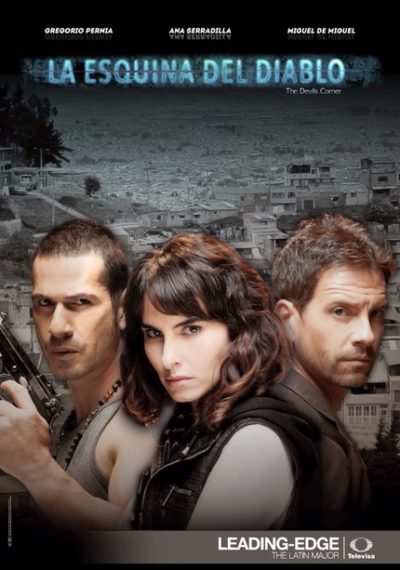 You’re in deep in Devil’s Corner
You’re in deep in Devil’s Corner
And you already realize it’s hard to get out.
What would you do if there’s no place to run
Sharpen your senses and defend yourself well
In Devil’s Corner, walking towards love
Dodging bullets and risking your heart
It’s so hard to escape from Devil’s Corner
Defying death I came here to fight
And to love
Thus goes the peppy pop ditty which plays over the opening credits of this Colombian telenovela. It stars Ana Serradilla, whom we previously saw as the heroine of La Viuda Negra. Here, she’s on the other side of the law, playing cop Ana García. She wants to be assigned to the special operations group. But her temper gets the best of her when she’s given a surreptitious test, interviewing a suspect who’s actually a policeman, and is deliberately trying to provoke her.
Fortunately, she gets a second chance to make a first impression, and is inserted in an undercover role to the aptly-named “La esquina del diablo” – the Devil’s corner. It’s a no-go zone for police, a ghetto perched high up on the hills overlooking the city. The area is controlled with an iron hand by the Velasco family, led by patriarch Angel (Tappan); they run drugs and other criminal activities, and have been a thorn in the side of the local authorities for years. Local cop Eder Martin (de Miguel) sends Ana into the area as a social worker, to gather information, after a helicopter crash supposedly kills Angel. However, it quickly turns out this was merely a ruse by the boss, to get the cops off his back. Can Ana embed herself deeply into the local community to complete her mission?
That’s just one – possibly not even the main one – of a number of plot threads which are woven into the fabric of the 70 episodes. Additional elements include:
- Angel’s second-in-command, Yago (Pernia), who was a childhood friend of Eder
- Angel’s son, Angelito, who is an ambitious loose cannon with psychopathic tendencies
- Eder’s relationship with the mayor’s daughter, and its conflict with the growing attraction to Ana
- Meanwhile, Ana’s gradual realization that Yago may not be as bad an apple as he seems
- The mayor’s political aspirations and presidential campaign
- Yago’s son is a promising football player, but is also on the verge of being recruited by Angelito
- The other undercover cop, who befriends Angelito in jail and helps him escape
- The mysterious “He”, a rival crime boss who inhabits the upper echelon of the city’s elite
- The serial killer who is leaving a trail of women’s corpses, tattooed with numbers on their shoulders
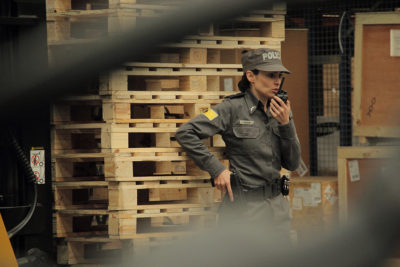 Phew. This cornucopia of plot-lines likely both the series’s biggest strength and its greatest weakness. There’s no doubt it’s actually very well-handled by the writers and cast: even the relatively minor characters are given an impressive amount of depth, and the script never gets jumbled or confused. This is a sharp contrast to Camelia la Texana, the show I’m currently watching: you don’t so much follow the plot, as desperately cling to it, as various groups of sideburn-wearing people scheme against each other. It’s also a contrast, in another way, to Viuda Negra, which was unashamedly about Griselda Blanco. In this case, the breadth of focus inevitably leads to a dilution of why we’re here, with poor Ana often sidelined.
Phew. This cornucopia of plot-lines likely both the series’s biggest strength and its greatest weakness. There’s no doubt it’s actually very well-handled by the writers and cast: even the relatively minor characters are given an impressive amount of depth, and the script never gets jumbled or confused. This is a sharp contrast to Camelia la Texana, the show I’m currently watching: you don’t so much follow the plot, as desperately cling to it, as various groups of sideburn-wearing people scheme against each other. It’s also a contrast, in another way, to Viuda Negra, which was unashamedly about Griselda Blanco. In this case, the breadth of focus inevitably leads to a dilution of why we’re here, with poor Ana often sidelined.
This is a shame, since the heroine here is shown in the first episode, as fully capable of single-handedly taking out and/or down multiple villains with her skills. The mission here is much less direct: it’s very much undercover intelligence-gathering. She can’t kick ass, because that is not what social workers do: if she did, anyone who saw it would have cause to suspect Ana’s real identity and mission, immediately becoming part of the problem. So instead, there’s a lot more skulking around, trying to earn the trust of Eder, and narrow escapes from being caught by Velasco’s gang. After what we saw at the beginning, this passive approach seems like a sad waste of her law-enforcement talents.
This is the main reason for the relatively low score above. For in some ways, it’s the best of the shows I’ve seen, in terms of combining characters and plots in an engaging way. I’m impressed with the non-specific nature of the location, mentioning no particular country or city. The sharp divide between rich and poor, with the latter living in ghettos run by a largely criminal element, reminded me of the Rio favelas – I highly recommend you watch the amazing Elite Squad if you want a glimpse of the hellish life there. But I would imagine it’s equally likely to be Colombia, since that’s where the series was actually shot. The series does well too, in portraying the moral grey-scale: between Ana at one end and Angelito at the other, most making choices based on pragmatism rather than idealism.
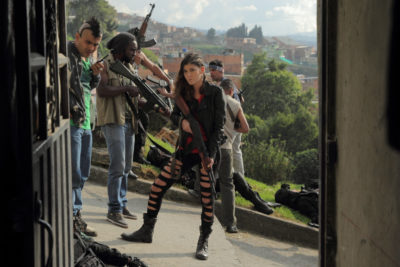 There are a lot of interesting supporting characters: not so much Eder and Yago, who are fairly cookie-cutter in terms of being opposing romantic heroes, with dark, troubled (and somewhat shared) pasts. It’s mostly on the fringes of Velasco’s gang that all the fun is to be found. Cachalote (Julián Caicedo) is a burly thug with a surprisingly soft heart – he has an unrequited crush on the mayor’s daughter, formed during her kidnapping. Meteoro (Erick Leonardo Cuellar) is the gang’s drug chemist, though he looks and acts like a methed-up version of Giorgio Tsoukalos, from the Ancient Aliens show. Most notable of all is Michelle (Estefania Piñeres, right), a hard-nosed barrio brat who is more than capable of holding her own in the tough environment, and is ferociously loyal to her boss. She would have enough stories to tell for her own, lengthy series, I’ve no doubt about that.
There are a lot of interesting supporting characters: not so much Eder and Yago, who are fairly cookie-cutter in terms of being opposing romantic heroes, with dark, troubled (and somewhat shared) pasts. It’s mostly on the fringes of Velasco’s gang that all the fun is to be found. Cachalote (Julián Caicedo) is a burly thug with a surprisingly soft heart – he has an unrequited crush on the mayor’s daughter, formed during her kidnapping. Meteoro (Erick Leonardo Cuellar) is the gang’s drug chemist, though he looks and acts like a methed-up version of Giorgio Tsoukalos, from the Ancient Aliens show. Most notable of all is Michelle (Estefania Piñeres, right), a hard-nosed barrio brat who is more than capable of holding her own in the tough environment, and is ferociously loyal to her boss. She would have enough stories to tell for her own, lengthy series, I’ve no doubt about that.
However, as an action heroine series, it’s undeniably a disappointment: I was expecting much more focus on the central character, based both on Negra and the first episode. And, indeed, much more action. As a regular TV show, it would deserve a higher rating, likely a full star better, since I genuinely did enjoy it. It just isn’t quite the fit for the site which I was hoping to see.
Star: Ana Serradilla, Miguel de Miguel, Gregorio Pernía, Christian Tappan
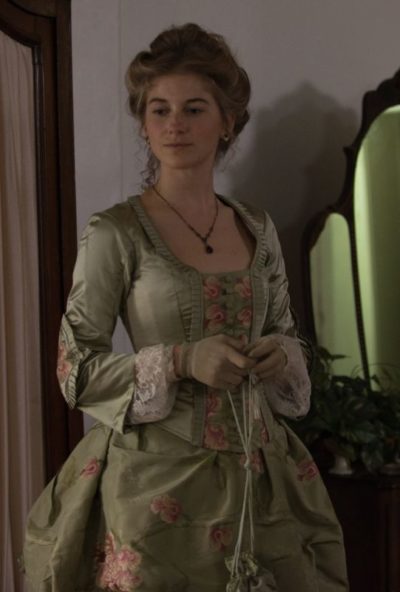 Game of Thrones, this clearly isn’t. But both Chris and I were struck by the similarities between what befalls the main character here, and the re-programming which Anya Stark underwent at the hands of the Faceless Men. Because the first, and arguably key, step in both is to destroy the existing personality, so there is a blank slate – the phrase “tabula rasa” is explicitly used here – on which the new character can be drawn. In this case, the victim is Isabel Porter (Gallerani), a young woman who has sunk into depression after the death of her parents. She opts for a stay at the Rosewood Institute, a highly regard mental sanatorium in Baltimore.
Game of Thrones, this clearly isn’t. But both Chris and I were struck by the similarities between what befalls the main character here, and the re-programming which Anya Stark underwent at the hands of the Faceless Men. Because the first, and arguably key, step in both is to destroy the existing personality, so there is a blank slate – the phrase “tabula rasa” is explicitly used here – on which the new character can be drawn. In this case, the victim is Isabel Porter (Gallerani), a young woman who has sunk into depression after the death of her parents. She opts for a stay at the Rosewood Institute, a highly regard mental sanatorium in Baltimore.




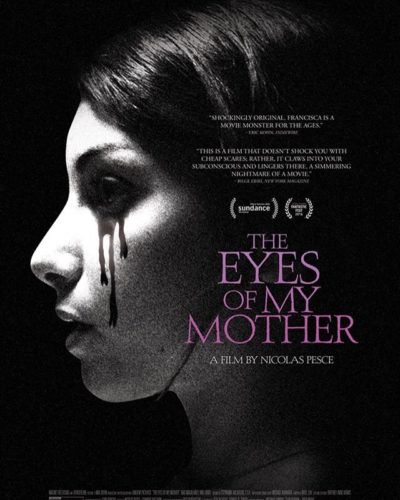 “Post-horror” is now, apparently, A Thing. It refers to horror films that subvert the traditional tropes and style of the genre in some way. Though based on the so-tagged example of it I’ve seen, the main subversion appears to be “not being frightening.” I think there’s a spot of pretension mixed in as well, since horror is generally regarded as marginally above pornography in terms of critical appreciation. By calling it something else, this gives those who turn their nose up at “horror” a chance to appreciate it. But it’s a bit of a double-edged sword for marketing, because you’re as likely to lose fans of “true” horror, who have been burned badly by films riding on the genre’s coat-tails.
“Post-horror” is now, apparently, A Thing. It refers to horror films that subvert the traditional tropes and style of the genre in some way. Though based on the so-tagged example of it I’ve seen, the main subversion appears to be “not being frightening.” I think there’s a spot of pretension mixed in as well, since horror is generally regarded as marginally above pornography in terms of critical appreciation. By calling it something else, this gives those who turn their nose up at “horror” a chance to appreciate it. But it’s a bit of a double-edged sword for marketing, because you’re as likely to lose fans of “true” horror, who have been burned badly by films riding on the genre’s coat-tails.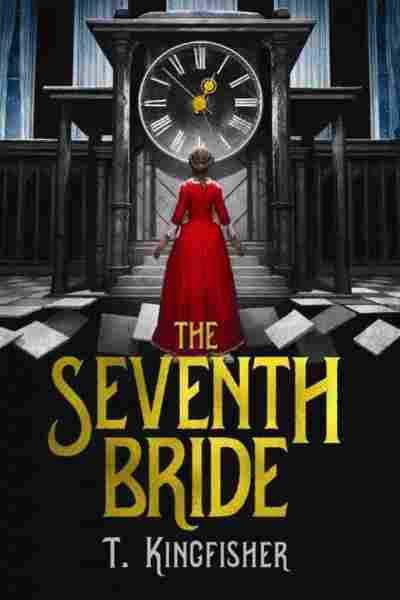 Almost all the action heroine novels I’ve read of late have been Volume 1 in a series. While not necessarily a bad thing, this does tend to lead to a sense of unfulfilled resolution. “Happy ever after” is frequently replaced by a semi-cliffhanger, intend to separate the reader from their cash for Volume 2. It rarely works, and is more likely to annoy me. After all, I’ve invested significant quantities of time (if not perhaps money; these introductory items tend to be of the 99-cent variety, so I guess the buyer should beware) in each tale, and to be left dangling is frustrating. That’s why it was especially nice to read a book like this, which tells a complete story, with a beginning, a middle and a solid, satisfactory end.
Almost all the action heroine novels I’ve read of late have been Volume 1 in a series. While not necessarily a bad thing, this does tend to lead to a sense of unfulfilled resolution. “Happy ever after” is frequently replaced by a semi-cliffhanger, intend to separate the reader from their cash for Volume 2. It rarely works, and is more likely to annoy me. After all, I’ve invested significant quantities of time (if not perhaps money; these introductory items tend to be of the 99-cent variety, so I guess the buyer should beware) in each tale, and to be left dangling is frustrating. That’s why it was especially nice to read a book like this, which tells a complete story, with a beginning, a middle and a solid, satisfactory end.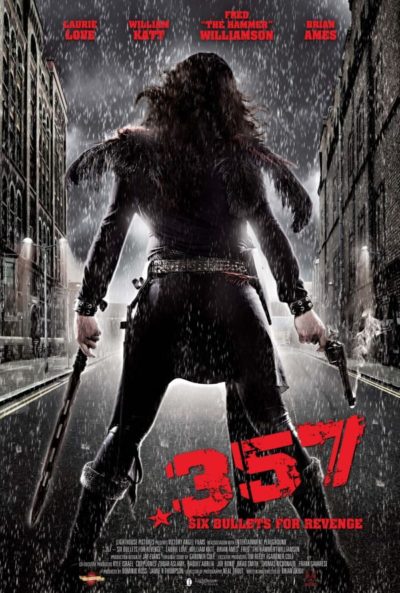 It wasn’t until the end, when the credits ran and I saw someone’s name I knew, that I realized this was actually a local production, shot here in Phoenix. Maybe I should have been paying more attention, or maybe that just speaks to the bland lack of place present in this low-budget Crow knock-off. For, despite the poster which is obviously riffing off another comic-book movie, this one is clearly inspired by Alex Proyas’s cult classic. I am, however, pleased to report that the lead star here did actually make it through the entirety of production with a pulse, so they come out ahead of their inspiration in that department.
It wasn’t until the end, when the credits ran and I saw someone’s name I knew, that I realized this was actually a local production, shot here in Phoenix. Maybe I should have been paying more attention, or maybe that just speaks to the bland lack of place present in this low-budget Crow knock-off. For, despite the poster which is obviously riffing off another comic-book movie, this one is clearly inspired by Alex Proyas’s cult classic. I am, however, pleased to report that the lead star here did actually make it through the entirety of production with a pulse, so they come out ahead of their inspiration in that department. You’re in deep in Devil’s Corner
You’re in deep in Devil’s Corner Phew. This cornucopia of plot-lines likely both the series’s biggest strength and its greatest weakness. There’s no doubt it’s actually very well-handled by the writers and cast: even the relatively minor characters are given an impressive amount of depth, and the script never gets jumbled or confused. This is a sharp contrast to Camelia la Texana, the show I’m currently watching: you don’t so much follow the plot, as desperately cling to it, as various groups of sideburn-wearing people scheme against each other. It’s also a contrast, in another way, to Viuda Negra, which was unashamedly about Griselda Blanco. In this case, the breadth of focus inevitably leads to a dilution of why we’re here, with poor Ana often sidelined.
Phew. This cornucopia of plot-lines likely both the series’s biggest strength and its greatest weakness. There’s no doubt it’s actually very well-handled by the writers and cast: even the relatively minor characters are given an impressive amount of depth, and the script never gets jumbled or confused. This is a sharp contrast to Camelia la Texana, the show I’m currently watching: you don’t so much follow the plot, as desperately cling to it, as various groups of sideburn-wearing people scheme against each other. It’s also a contrast, in another way, to Viuda Negra, which was unashamedly about Griselda Blanco. In this case, the breadth of focus inevitably leads to a dilution of why we’re here, with poor Ana often sidelined. There are a lot of interesting supporting characters: not so much Eder and Yago, who are fairly cookie-cutter in terms of being opposing romantic heroes, with dark, troubled (and somewhat shared) pasts. It’s mostly on the fringes of Velasco’s gang that all the fun is to be found. Cachalote (Julián Caicedo) is a burly thug with a surprisingly soft heart – he has an unrequited crush on the mayor’s daughter, formed during her kidnapping. Meteoro (Erick Leonardo Cuellar) is the gang’s drug chemist, though he looks and acts like a methed-up version of Giorgio Tsoukalos, from the Ancient Aliens show. Most notable of all is Michelle (Estefania Piñeres, right), a hard-nosed barrio brat who is more than capable of holding her own in the tough environment, and is ferociously loyal to her boss. She would have enough stories to tell for her own, lengthy series, I’ve no doubt about that.
There are a lot of interesting supporting characters: not so much Eder and Yago, who are fairly cookie-cutter in terms of being opposing romantic heroes, with dark, troubled (and somewhat shared) pasts. It’s mostly on the fringes of Velasco’s gang that all the fun is to be found. Cachalote (Julián Caicedo) is a burly thug with a surprisingly soft heart – he has an unrequited crush on the mayor’s daughter, formed during her kidnapping. Meteoro (Erick Leonardo Cuellar) is the gang’s drug chemist, though he looks and acts like a methed-up version of Giorgio Tsoukalos, from the Ancient Aliens show. Most notable of all is Michelle (Estefania Piñeres, right), a hard-nosed barrio brat who is more than capable of holding her own in the tough environment, and is ferociously loyal to her boss. She would have enough stories to tell for her own, lengthy series, I’ve no doubt about that. Valerie Graves (Osborne) is a powder-keg in her mid-twenties, barely surviving from job to job, and troubled by violent dreams. At a party, she meets Andy Cheney, who runs a locksmith company, and who offers her an admin job there. She eventually discovers the company is a front for far more questionable business, and eagerly accepts Andy’s offer of working on that side, collecting debts and enforcing his authority on those lower down the food-chain. But when one of her missions ends up hitting too close to home, she decides she’s going to quit. Her boss doesn’t take kindly to that, and stiffs her of the final payment she needs to set up life somewhere else. Which, needless to say, does not sit too well with Valerie.
Valerie Graves (Osborne) is a powder-keg in her mid-twenties, barely surviving from job to job, and troubled by violent dreams. At a party, she meets Andy Cheney, who runs a locksmith company, and who offers her an admin job there. She eventually discovers the company is a front for far more questionable business, and eagerly accepts Andy’s offer of working on that side, collecting debts and enforcing his authority on those lower down the food-chain. But when one of her missions ends up hitting too close to home, she decides she’s going to quit. Her boss doesn’t take kindly to that, and stiffs her of the final payment she needs to set up life somewhere else. Which, needless to say, does not sit too well with Valerie. It is pretty close to an article of faith that no movie starring Yukari Oshima and Cynthia Khan can ever be entirely worthless. This film, however, shakes that belief to its very foundation. Not least because despite the cover and credits, found just about everywhere (including here), it barely stars them – indeed, Khan doesn’t even show up for the finale, with absolutely no explanation provided. This is included here, mostly as a warning, and because I’m a stickler for completeness with regard to their filmographies. Though in this case, I suspect, I’m less a stickler and more the sucker.
It is pretty close to an article of faith that no movie starring Yukari Oshima and Cynthia Khan can ever be entirely worthless. This film, however, shakes that belief to its very foundation. Not least because despite the cover and credits, found just about everywhere (including here), it barely stars them – indeed, Khan doesn’t even show up for the finale, with absolutely no explanation provided. This is included here, mostly as a warning, and because I’m a stickler for completeness with regard to their filmographies. Though in this case, I suspect, I’m less a stickler and more the sucker. Taryn St. Giles is an out of work archaeologist, who has taken up bounty hunting in order to pay the overdue rent, after the untimely death of her current patron. However, her latest target turns out to be considerably more than she can handle. For Alric is a master of both disguise and hand-to-hand combat, and Taryn’s pursuit of him rapidly entangles the heroine in a deepening web of magic and intrigue. The titular artifact – which doesn’t actually show up until well into the second half – is a potential gate, which could open a doorway and leave this world a thoroughly unpleasant place for just about everyone. Fortunately, Taryn has friends both academic and physically-inclined on her side, as well as a trio of semi-domesticated fairies. Though the last-named are engaged in their own war, with a local family of squirrels.
Taryn St. Giles is an out of work archaeologist, who has taken up bounty hunting in order to pay the overdue rent, after the untimely death of her current patron. However, her latest target turns out to be considerably more than she can handle. For Alric is a master of both disguise and hand-to-hand combat, and Taryn’s pursuit of him rapidly entangles the heroine in a deepening web of magic and intrigue. The titular artifact – which doesn’t actually show up until well into the second half – is a potential gate, which could open a doorway and leave this world a thoroughly unpleasant place for just about everyone. Fortunately, Taryn has friends both academic and physically-inclined on her side, as well as a trio of semi-domesticated fairies. Though the last-named are engaged in their own war, with a local family of squirrels. This crisp little Argentinian film clocks in at 70 minutes – not even enough to be considered a feature by the Screen Actors Guild. You’ll understand, therefore, there isn’t much fat on its bones. Virginia (Cardinali) has left her husband, taking daughter, Rebecca (Duranda), with her. But a moment’s inattention at a gas-station proves fatal, as Rebecca is abducted, and Virginia’s car driven off the road during the subsequent pursuit. Brought back (from the dead?) by a mysterious stranger (Ferro), she is told Rebecca has been chosen by a religious cult as a sacrifice. It’s up to Virginia to stop them, and she can let no-one get in her way. Which becomes an issue, for we quickly find out, she is not the only mother looking to recover a child from the cult – and, it appears, only one can succeed.
This crisp little Argentinian film clocks in at 70 minutes – not even enough to be considered a feature by the Screen Actors Guild. You’ll understand, therefore, there isn’t much fat on its bones. Virginia (Cardinali) has left her husband, taking daughter, Rebecca (Duranda), with her. But a moment’s inattention at a gas-station proves fatal, as Rebecca is abducted, and Virginia’s car driven off the road during the subsequent pursuit. Brought back (from the dead?) by a mysterious stranger (Ferro), she is told Rebecca has been chosen by a religious cult as a sacrifice. It’s up to Virginia to stop them, and she can let no-one get in her way. Which becomes an issue, for we quickly find out, she is not the only mother looking to recover a child from the cult – and, it appears, only one can succeed. Coming out of the micro-budget scene in New Mexico, this is a straightforward tale of vengeful “hell kittens”, to quote the official synopsis. Bella Meurta (Kate) is a hooker, who kills one of her clients after he gets rough with her. In revenge, her little sister is savagely beaten and left dead [note: not left
Coming out of the micro-budget scene in New Mexico, this is a straightforward tale of vengeful “hell kittens”, to quote the official synopsis. Bella Meurta (Kate) is a hooker, who kills one of her clients after he gets rough with her. In revenge, her little sister is savagely beaten and left dead [note: not left